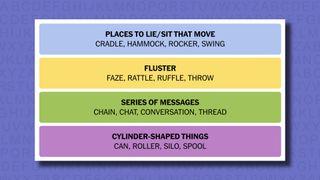If you love word games and brain teasers, then the New York Times’ Connections puzzle is just the thing for you. Published every Saturday, this mind-bending crossword puzzle challenges players to find the common thread that connects seemingly unrelated clues. For the avid puzzler, it’s a thrilling exercise in lateral thinking and deduction. In this article, we’ll delve into the hints and answers for the recent Connections puzzle released on Saturday, October 26 (game #503).
For those unfamiliar with Connections, the puzzle consists of four sections, each containing nine clues. The goal is to find a common thread that links all the answers within each section, resulting in four different connections overall. It’s not as simple as common categories or themes, as the connections can range from shared letters or words to more abstract concepts.
In game #503, the first section featured clues like ”High rollers?” and “Hit close to home.” The answers for this section were “DICE” and “STRIKE,” respectively. The common thread between them? Both words can be preceded by the word “DEAD,” forming the phrases “DEAD DICE” and “DEAD STRIKE.”
Moving on to section two, the clues included “Startup’s aid” and “Sport with a safety line.” The answers were “SEED” and ”CLIMB,” respectively. The connection here lies in the concept of progression or growth. A “SEED” aids a startup’s growth, and “CLIMB” refers to a sport that requires ascending to higher levels, often with the help of a safety line.
Section three’s clues were “Like some speeches” and “Cuisine whose name is a Sokoke Panami word.” The corresponding answers were “GRAVE” and “ITALIAN,” respectively. The commonality between these seemingly disparate words is revealed when you consider that both answers function as adjectives and can describe either a “speech” or “cuisine.” So, one can deliver a “GRAVE” speech or enjoy an “ITALIAN” cuisine.
Lastly, section four featured clues like “Face larger than life” and “Rhodes or Fulbright”. The answers were “BIG BEN” and “SCHOLAR,” respectively. The connection here lies in their association with the United Kingdom. “BIG BEN” is the iconic clock tower in London, England, and ”SCHOLAR” refers to prestigious scholarships like the Rhodes Scholarship and Fulbright Scholarship.
Solving the New York Times’ Connections puzzle can be a challenging yet rewarding exercise for puzzle enthusiasts. It not only tests your knowledge of trivia and language but also pushes you to think creatively and make unconventional connections. It encourages a different way of thinking, where patterns and associations are key to solving the puzzle.
While game #503 only scratches the surface of the connections that can be made, it showcases the engaging and thought-provoking nature of the puzzle. So, if you’re up for a mental workout that will leave you feeling accomplished and enlightened, the Connections puzzle from the New York Times might just be the perfect Saturday activity for you.

